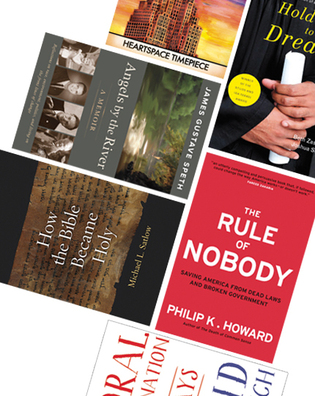 loading
loading
Arts & CultureOutput View full imageMoral Imagination: Essays This graceful collection of essays is all over the content map, from Shakespeare and Lincoln to Joyce Maynard ’75 and Edward Snowden, but each wrestles with “the relationship between power and conscience.” Bromwich also explores the modern tension between moral imagination—an expansiveness of spirit and intellect that “compels us to grant the highest possible reality and the largest conceivable claim to a thought, action, or person that is not our own”—and cultural identity, the “social fixity that obstructs imagination.”
The Rule of Nobody: Saving America from Dead Laws and Broken Government In a provocative call to streamline government, lawyer Howard offers 18 propositions, such as restoring the ability to make public choices and turning the repair of democracy into “a moral imperative for citizens, not just public officials.” The author, who skewers both political parties, urges that we “scrape away decades of encrusted law” and replace it with “the old vision of human responsibility.”
Angels by the River: A Memoir Speth looks back on a life of fierce devotion to protecting the natural world—as cofounder of the Natural Resources Defense Council, administrator of the UN Development Programme, and dean of Yale’s environment school, to name a few of his posts. The South Carolina native also critiques the mistakes of the environmental movement he was and is part of, and sketches a blueprint for a growing and stronger movement of the future.
Hold Fast to Dreams: A College Guidance Counselor, His Students, and the Vision of a Life Beyond Poverty In 2006, Steckel left his job as a college counselor at an elite New York City private school to guide students at Brooklyn’s low-income and mostly minority public Secondary School for Research. Steckel and coauthor Zasloff (also his wife) take an honest and inspirational look at ten of his charges and the challenges they faced getting into and through college. The authors also lay out how the system can be changed to “do more than replicate the status quo.”
Heartspace Timepiece As a Yale undergrad active in the campus music scene, O’Leary (a former writer/assistant for the Yale Alumni Magazine) decried the sameness of many local bands. She puts that argument to music in this confident, eclectic new album, her third release but the first to fully utilize Champions of the West, the simpatico backing band she’s had since 2011. A wide range of pop attitudes are on display here, and O’Leary mixes emotional turmoil with fearless optimism in catchy songs like “Positive Drag” and “Talk Me Down.”
How the Bible Became Holy According to tradition, the various texts assembled into the Bible were authoritative and widely accepted from inception. But modern scholarship has cast considerable doubt on that notion, even suggesting, says biblical historian Satlow, that “‘the peoples of the book’ did not know their book very well.” Satlow traces more than a thousand years of history during which the texts—which played little role in most lives originally—acquired their power. “This is perhaps the Bible’s greatest legacy,” he writes: “the radically implausible notion that one can build a community, a religion, a culture, and even a country around a text.”
The comment period has expired.
|
|